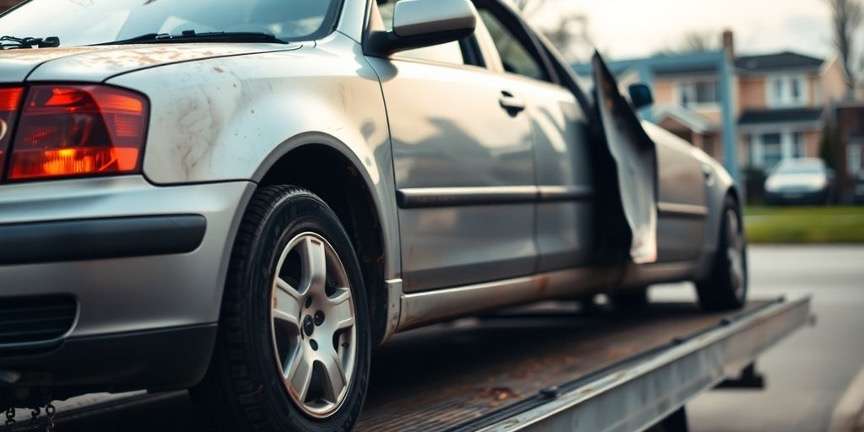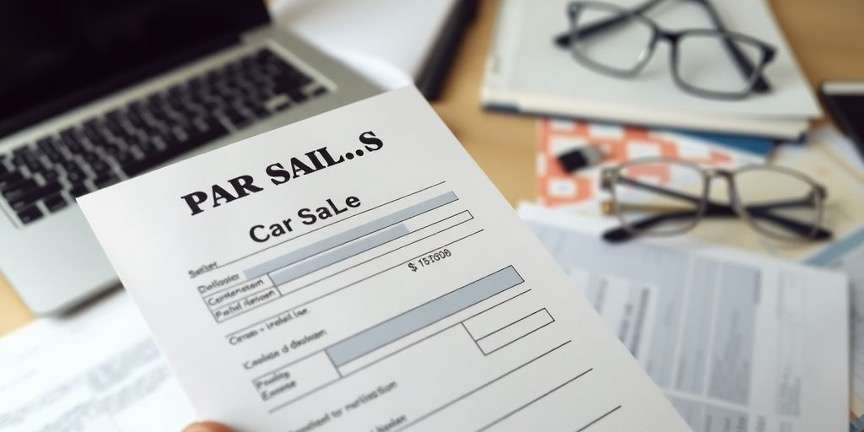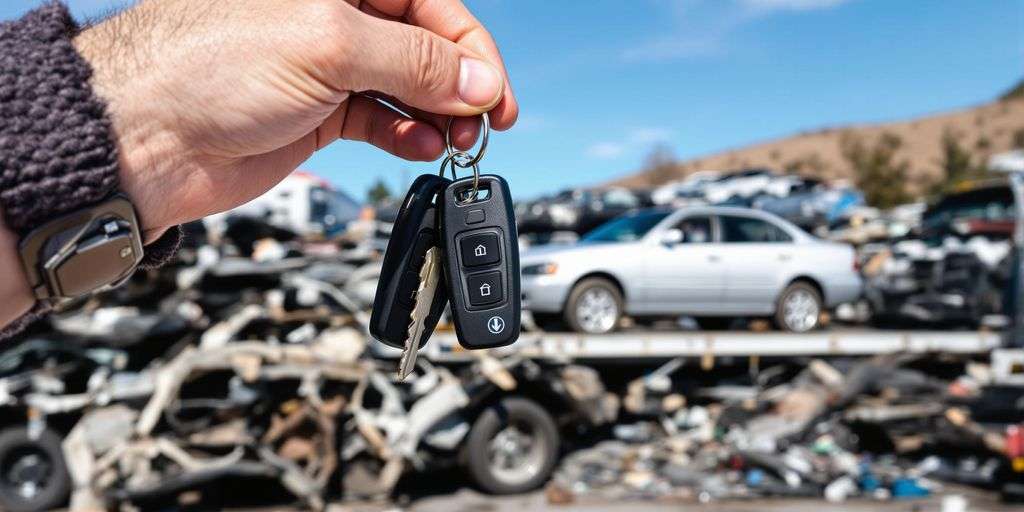Key Takeaways
- Canceling your car's registration after selling it as junk is crucial to avoid future liabilities.
- Gather all necessary documents, like the title and bill of sale, to streamline the cancellation process.
- Inform your local DMV about the sale to officially remove the car from your records.
- Don't forget to return the license plates to the DMV as part of the deregistration process.
- Keep proof of cancellation and related documents for your records to protect against any future disputes.
Understanding the Importance of Cancelling Your Car's Registration
Why Cancelling Registration is Crucial
When you sell your car as junk, it's not just about getting rid of a hunk of metal; it’s about tying up all the loose ends, and cancelling your car's registration is a big part of that. It's crucial to cancel the registration because it formally ends your responsibility for the vehicle. Without this step, your name stays on record, which means you could be on the hook for anything that happens with the car later. Imagine getting a parking ticket for a car you no longer own—what a nightmare!
Potential Consequences of Not Cancelling
Skipping the cancellation of your car's registration can lead to some pretty annoying consequences. Here’s what you might face:
- Legal Liability: If the car gets involved in any illegal activity after it leaves your hands, you could still be considered legally responsible.
- Financial Penalties: You might continue to receive bills for registration fees or fines.
- Insurance Issues: Your insurance might not automatically cancel, leading to extra charges.
Legal Obligations After Selling a Junk Car
Selling a junk car isn’t just a simple transaction; it comes with legal obligations. One of the first things you should do is notify the Department of Motor Vehicles about the sale. This is a legal requirement in many places and helps ensure that your name is removed from the vehicle's records.
“Handling the paperwork might seem like a hassle, but it's your best bet to avoid future headaches. Once the car is out of your life, you want to make sure all the legal ties are cut too.”
In some states, you might also need to submit a release of liability form or similar documentation. Always check with your local DMV to understand the specific requirements in your area.
Gathering Necessary Documents for a Smooth Cancellation Process
Essential Documents You Need
Before you even think about canceling your car's registration, make sure you've got all your paperwork in order. The car's title, often called the pink slip, is the most important document you need. It proves you own the vehicle and lets you transfer ownership to the junkyard or buyer. If you've lost it, don’t panic. You can apply for a replacement at your local DMV.
You'll also need the vehicle registration, which provides all the identifying details of your car. Don't forget a valid ID, like a driver's license or state ID, to prove who you are. Keeping these documents handy will save you a lot of headaches.
How to Obtain Missing Documents
Lost your car title or registration? It's not the end of the world. Just head over to your local DMV office or their website. You'll usually need to fill out a form and pay a small fee. For example, in California, getting a replacement title costs about $20. Make sure to check the specific requirements and fees for your state.
If you need a bill of sale or proof of past insurance, reach out to the buyer or your insurance company. They might have copies you can use.
State-Specific Document Requirements
Each state has its own set of rules when it comes to selling a junk car and canceling its registration. Some states might need additional documents like a bill of sale or an emissions test certificate. It's a good idea to contact your local DMV to get a clear list of what's needed.
Here's a quick checklist of what you might need:
- Car title
- Vehicle registration
- Bill of sale
- Insurance documents
- Valid ID
Make it a point to gather all these documents early in the process. It’ll make everything smoother when you’re ready to cancel the registration and sell your car as junk.
By gathering essential documents ahead of time, you can ensure a hassle-free sale and avoid any legal hiccups.
Steps to Notify the Department of Motor Vehicles (DMV)
How to Contact Your Local DMV
First things first, you need to get in touch with your local DMV. It's pretty straightforward, but you have a few options. You can:
- Visit in person: This is often the quickest way to get things done, but it might require some waiting.
- Call them up: Most DMVs have a customer service line. Be ready to wait, though. Those lines can be busy.
- Use their website: Many DMVs offer online services. You might be able to handle everything without leaving your couch.
Information to Provide to the DMV
When you're ready to notify the DMV about selling your car, make sure you have all the necessary information handy. Here's what you'll typically need:
- Vehicle Identification Number (VIN): This is crucial for identifying your car in their system.
- Proof of sale: A bill of sale or similar document to show the car's been sold.
- Your personal identification: Like a driver's license or state ID.
What to Expect After Notification
Once you've notified the DMV, there are a few things you can expect. They'll update their records to show you no longer own the car. This means you're off the hook for any future tickets or fees. You might receive a confirmation letter or email, so keep an eye out for that. If you don't hear back within a few weeks, it might be worth following up just to make sure everything's squared away.
Taking the time to properly notify the DMV can save you a lot of hassle down the road. Better safe than sorry!
Handling License Plates and Other Vehicle Identifiers
Properly Removing License Plates
When you decide to sell your car as junk, one of the first things you need to do is take off those license plates. It's pretty straightforward:
- Unscrew the plates from both the front and back of your car.
- Keep them in a safe spot. You don't want them getting lost or damaged.
- Take them to your local DMV office when you're ready.
Getting them off and handing them in is a key step. It helps keep everything above board and avoids any future headaches.
Returning Plates to the DMV
Once you've got your plates off, it's time to return them to the DMV. Why? Because it's part of officially deregistering your car. Here's what you need to do:
- Head to your local DMV office with the plates.
- Submit them and ask for a receipt. This is your proof that you've done your part.
This little piece of paper can save you from a lot of potential trouble down the line. Hold onto it!
Dealing with Vehicle Identification Numbers
Your Vehicle Identification Number (VIN) is like your car's fingerprint. It's unique and ties directly to your car's history. When selling your car as junk, make sure you:
- Double-check that the VIN on your paperwork matches the one on your car.
- Include the VIN in any documentation you provide to the buyer or the DMV.
This ensures there's no mix-up about which car is being sold and helps prevent any issues with branded car titles.
Remember, handling these details carefully can protect you from future liabilities. It's all about making sure everything is clear and above board.
Finalizing the Cancellation and Protecting Yourself Legally

Obtaining Proof of Cancellation
After you’ve informed the DMV about the sale of your junk car, it’s important to get proof that the registration has been canceled. This proof is your safety net, ensuring that you’re not held accountable for any future mishaps involving the vehicle. Usually, the DMV will provide a confirmation, which you should keep in a secure place. If they don't offer this automatically, make sure to ask for it.
Keeping Records for Future Reference
Document everything! Keep copies of the bill of sale, cancellation confirmation, and any correspondence with the DMV. These records can be a lifesaver if any disputes arise later. It's like having a paper trail that proves the car is no longer your responsibility. Store these documents in a file or digital folder where you can easily find them if needed.
Legal Protections After Cancellation
Once the registration is canceled, you’re generally free from most liabilities tied to the car. However, it’s wise to double-check state-specific laws to ensure full compliance. You wouldn’t want any surprises down the road. In some states, dealerships typically do not have to provide refunds or repairs for cars sold “as is”, so understanding these nuances can further shield you legally. Always verify with local authorities or legal advisors to be fully protected.
Dealing with Insurance and Financial Accounts Post-Sale

Cancelling Your Car Insurance
So, you've just sold your car to the junkyard. First thing's first, cancel your car insurance policy. You don't want to pay for coverage on a car you no longer own, right? Contact your insurance provider and let them know about the sale. They'll ask for some details, maybe even a copy of the bill of sale. Once everything's squared away, they should cancel your policy without any hassle.
Handling Toll and Subscription Services
Next up, those pesky toll and subscription services. If your car's been zipping through toll booths or has any subscriptions tied to it, make sure you cancel or transfer those accounts. Overlooking this could mean extra charges landing in your lap. Give the service providers a call, explain the situation, and sort it out.
Managing Financial Liabilities
Lastly, let's talk money. If you had any loans or liens on the car, you need to clear those up. Contact your lender to ensure the loan is paid off. If there's any leftover balance after the sale, you'll need to cover that. Keep all paperwork handy—proof of payoff can save you a headache down the line.
Selling your car as junk doesn't just end with handing over the keys. Handling the financial side of things ensures you're not stuck with unexpected bills or liabilities later on. It's all about wrapping things up neatly to move on without a hitch.
And don't forget, when you sell a car to a junkyard, remove all sensitive documentation from the vehicle. You wouldn't want any personal info getting into the wrong hands.
Common Challenges and How to Overcome Them
Dealing with Lost or Missing Titles
Losing your car's title can feel like a huge roadblock when selling your junk car. Without this document, transferring ownership becomes tricky. But don't panic! Here's what you can do:
- Apply for a Duplicate Title: Head over to your local DMV office or their website to request a duplicate. You'll likely need to fill out a form and pay a small fee.
- Gather Necessary Identification: Make sure you have a valid ID and any other required documents ready.
- Be Patient: Processing times can vary, so it might take a few weeks to get your duplicate title.
Handling Disputes with Buyers
Disputes with buyers can turn a simple sale into a headache. To avoid this:
- Clear Communication: From the get-go, be upfront about the car's condition. Honesty is key.
- Document Everything: Keep a record of all communications and agreements.
- Meet in Safe Places: If possible, finalize transactions in public areas to ensure safety.
Navigating State-Specific Regulations
Every state has its own rules for selling junk cars, which can be confusing. Here's how to tackle this:
- Research Local Laws: Check your state's DMV website for specific regulations.
- Consult a Professional: Sometimes, a quick chat with a legal expert or a DMV representative can clear things up.
- Stay Updated: Regulations can change, so make sure you're working with the most recent information.
Selling a junk car isn't always straightforward, but with the right approach, you can navigate these challenges and complete your sale smoothly. Remember, preparation and patience are your best allies in this process.
Tips for a Hassle-Free Junk Car Sale
Preparing Your Car for Sale
Getting your junk car ready for sale is more than just a quick clean-up. Start by removing all personal items from the vehicle. Check every nook and cranny—glove compartment, trunk, and under the seats. Once cleared, give the car a good wash. It might seem unnecessary for a junk car, but a clean vehicle can make a big difference in how it's perceived by buyers. Finally, gather all service records. These documents can show potential buyers that the car has been maintained, even if it's headed for the scrap yard.
Maximizing the Value of Your Junk Car
Even if your car is destined for the junkyard, you can still squeeze out some extra dollars. Remove any valuable parts or accessories that could be sold separately. Think about items like a good set of tires, a working stereo, or even a catalytic converter. These components can fetch a decent price on their own. Also, consider selling to a junkyard that offers a competitive rate for scrap metal, ensuring you get the best bang for your buck.
Ensuring a Smooth Transaction
The key to a smooth transaction is all about paperwork and communication. Make sure you have a clear bill of sale that includes all necessary details: buyer and seller info, vehicle details, and the agreed price. If you don’t have the title, check with your local DMV for acceptable alternatives. Also, be upfront with the buyer about the car’s condition. Honesty can prevent disputes and make the sale process a lot smoother.
Selling a junk car might seem daunting, but with the right preparation and approach, it can be a straightforward process. Remember, a little effort in cleaning and organizing can go a long way in making the sale hassle-free.
Wrapping It Up
So, there you have it. Selling your car as junk and dealing with the registration can seem like a hassle, but it’s really just about following the steps. Make sure you’ve got all your paperwork in order, like the title and bill of sale, and don’t forget to take those plates off and hand them over to the DMV. It’s all about covering your bases so you don’t end up with any surprises down the road. And hey, once it’s all done, you can finally say goodbye to that old clunker and maybe even make a little cash. Just remember, each state has its own rules, so check with your local DMV to make sure you’re doing everything by the book. Good luck!
Frequently Asked Questions
Why is it important to cancel my car's registration after selling it as junk?
Canceling your car's registration is crucial to avoid any legal responsibilities or penalties associated with the vehicle after it's sold. It ensures the car is officially out of your name.
What documents do I need to cancel my car's registration?
You'll typically need the car's title, bill of sale, and possibly a form of identification. It's best to check with your local DMV for specific requirements.
How do I notify the DMV that I've sold my car as junk?
You can notify the DMV by submitting a notice of sale or a release of liability form. This can often be done online or in person at your local DMV office.
What should I do with the license plates after selling my car as junk?
You should remove the license plates and return them to your local DMV. This helps prevent any misuse of the plates.
Do I need to cancel my car insurance after selling it as junk?
Yes, you should cancel your car insurance to stop any future payments. Provide your insurance company with proof of the sale.
What if I can't find my car's title?
If your car's title is lost, you can request a replacement from your local DMV. This might require a fee and some additional paperwork.



